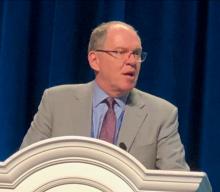LAS VEGAS – An estimated 10%-30% of patients with inflammatory bowel disease (IBD) don’t respond to biologics, leaving physicians with a big question: What now? Evidence suggests the best strategy is an approach grounded in therapeutic drug monitoring, appropriate disease monitoring, and other strategies, a gastroenterologist told colleagues.
“We can’t look at any one of these tools in isolation,” said Edward V. Loftus Jr., MD, professor of medicine at the Mayo Clinic in Rochester, Minn. He spoke about a reactive approach to stubborn cases of IBD at the annual congress of the Crohn’s & Colitis Foundation and the American Gastroenterological Association.
Dr. Loftus offered several tips and tidbits about managing IBD, especially when patients fail to appropriately respond to biologics.
- Many other conditions can cause symptoms that may appear to suggest lack of response to medication in IBD. These can include celiac disease, bacterial overgrowth, bile salt diarrhea, irritable bowel syndrome, hypersensitivity colitis, short bowel syndrome, and carbohydrate malabsorption. As a result, “before you make big changes in biologics or immunomodulators, make sure you’re actually confirming the presence of inflammation,” Dr. Loftus advised. Appropriate tests may be a colonoscopy/ileoscopy, CT or MR enterography, or a simple fecal calprotectin test; he also recommended that physicians exclude complications such as stricture, fistula, and abscess.
- The definition of lack of response in IBD has evolved over the years, Dr. Loftus said. The definition ideally refers to clinical response after an appropriate time period, such as 14 weeks of treatment (infliximab) or 8-12 weeks of treatment (injectable anti–tumor necrosis factor [TNF] drugs).
- Factors linked to primary nonresponse include disease duration of 2 years or more, smoking, and elevated C-reactive protein.
- Secondary lack of response – when drugs lose effectiveness over time even though they previously were effective – is common in IBD, with research suggesting it may affect about 20% of patients on infliximab or adalimumab.
- When patients fail to fully respond to a therapeutic level of an anti-TNF drug, research suggests it may be more effective to switch to another one rather than increase the dose, Dr. Loftus said.
- In cases of secondary lack of response in patients taking anti-TNF drugs, AGA guidelines suggest therapeutic drug monitoring may be appropriate, Dr. Loftus said. However, the AGA doesn’t make any recommendations regarding therapeutic drug monitoring in cases where IBD is dormant while patients are on anti-TNF drugs.
- Research suggests that a treat-to-target approach – designed to reach specific testing targets – may boost the effectiveness of therapeutic drug monitoring, Dr. Loftus said, and algorithm-based treatment might be even better.
“Therapeutic drug management in isolation will only get you so far,” he advised. “But don’t be confused. The drug level is not the target. The absence of inflammation is the target.”
Dr. Loftus reported recent relationships (research support and consultant) with multiple drugmakers, including AbbVie, Bristol-Myers Squibb, Pfizer, Gilead, Celgene, Eli Lilly, and several others.


